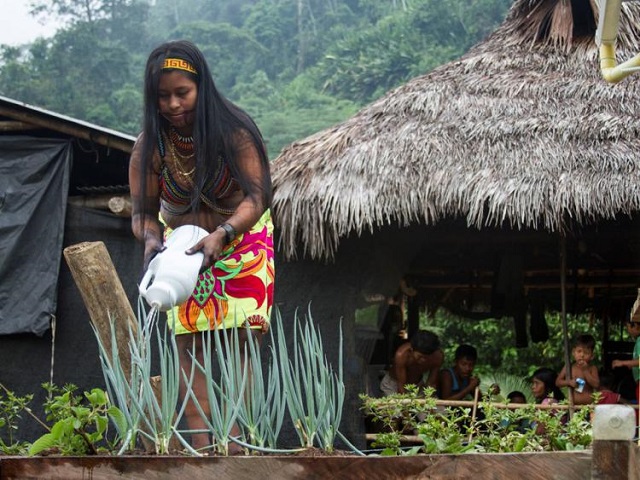Indigenous Peoples have been socially, economically, politically and judicially excluded for centuries. The unbalance puts them at a greater risk in the current challenging international landscape. On the Day of the World’s Indigenous Peoples, the EU extends its solidarity to all indigenous peoples. The EU is acting on the ground to mitigate the impact of COVID-19 and calls for global efforts to protect indigenous peoples.
The COVID-19 pandemic is posing enormous challenges to the entire human population, affecting in particular and disproportionately those who experience pre-existing inequalities and disadvantages. Indigenous peoples have too often been marginalised and their rights neglected. They have seen their communities being driven out of their territories, witnessed the devastation of natural resources, and remain experiencing lack of acknowledgement of their basic rights. Today, more than 476 million indigenous peoples are much more exposed to adversity.
Indigenous peoples are three times more likely to live in extreme poverty. A large percentage works in informal economy, without any social protection – which reinforces the vulnerability in the current circumstances. Issues of food insecurity due to income loss and the disruption of traditional activities are common.
Their health is also at risk. Lack of access to water and sanitation, but also to appropriate healthcare and information about COVID-19 makes it harder for many indigenous peoples to protect themselves.
Read also
The High Representative/Vice President Josep Borrell has recognised the seriousness of the situation, stating on behalf of the EU that “The EU extends its solidarity to all indigenous peoples around the world at a time when their health, lives and livelihoods are endangered by the COVID-19 pandemic”. Josep Borrell also calls for joint efforts: “(…) there is an urgent need to redouble global efforts to tackle the discrimination, racism and inequalities facing indigenous peoples.”
The EU is taking additional measures on the ground to support indigenous peoples. Ensuring food supply, health assistance and carrying out communication campaigns are some examples.
In the Amazonas, more than 700 thousand COVID-19 infections were registered by the end of July. The EU continues working with indigenous peoples, as well as all our partners, such as governments, international organisations or civil society, to combat the spread of the virus and its adverse impacts on the most vulnerable people.
As a concrete example, the EU has been supporting the Guarani Kaiowá people, by adapting its supporting programme to the current situation. A creative solution was designed to communicate about actions to prevent COVID-19: a sound car passing messages in the Guarani language in 14 indigenous villages of 4 municipalities. 20.000 booklets have also been made available in Portuguese and Guarani languages, illustrating preventive measures.
The EU is also giving support to sanitary barriers and to healthcare agents. Providing financial and juridical support to the indigenous managers of sanitary barriers so that they can control the entry and exit of indigenous villages is key to control the risk of infection. The purchase and distribution of Individual Protection Equipment also contributes to contain the spread of the virus and ensure the protection of medical staff.
Collaboration with partners that are acting on the ground has also proven to produce effective results. This is the case in the Argentinian Province of Salta, in the Colombian department of Amazonas and in the border regions of Brazil, Colombia and Venezuela. DG ECHO has been supporting international and local organisations in these areas.
In the Colombian department of Amazonas, the intervention will last for six months and provides emergency health, water and sanitation and food aid to more than 13,000 people in both rural and urban areas.
Cooperation with national governments is also important to ensure the involvement of states in the protection of its population. The project Amazonia 2.0(link is external), financed by the EU, brings together 6 Amazonian countries: Brazil, Colombia, Ecuador, Guyana, Peru and Surinam. The actions of this project have also been adapted to the current situation by redesigning its main objectives to include contingency measures to prevent and fight the spread of COVID-19.
A long journey
The EU has been supporting and cooperating with indigenous peoples for decades, reconfirming its commitment in 2019 at the United Nations General Assembly and by organising the EU Roundtable with Indigenous Peoples’ Experts and Representatives in February 2020 in Brussels. From this roundtable, suggestions have been made on how the EU can implement better its ambitious Green Deal.
Providing human rights protection remains a key priority. The EU has been working to combat the exposure to human rights violations, by support to human rights defenders in the reporting of crimes and in calling international attention to these. The European Instrument for Democracy and Human Rights (EIDHR) has been activated to support and finance more than 30,000 human rights defenders and their families from 2015 to 2019.
EU’s support to land governance and secure access and tenure of land is equally important. The EU is supporting land governance in about 40 countries with a total budget of €240 million. As an example, the EU’s support to land governance in Colombia enabled the collective titling of 280,000 hectares benefitting some 8,000 indigenous and Afro-Colombian families.
Indigenous peoples are part of the solution in answering to the global climate and environmental crisis. The protection and preservation of indigenous peoples’ territories are essential for the protection of biodiversity and climate. During the European Development Days (EDDs) held in June of 2019, the European External Action Service (EEAS) organised an event aimed at strengthening international solidarity and support to indigenous peoples and environmental human rights defenders.
Protecting the rights and the lives of indigenous peoples is central to the pursuit of a better world, respect for human rights, human diversity and for a more environmentally friendly world.
European Union
























































